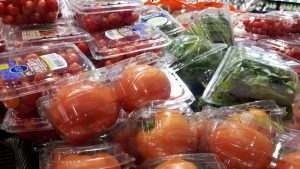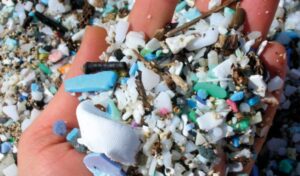- Regulatory Tools
- Circular Economy
- Government
- Government Policy
- Labelling
- Recycling
- Policy
- Strategy and Policy
- Take Action
- National
The slow death of plastic: Why the path to a plastic-less future is so complicated
A few years back, Valérie Leloup read a book called Zero Waste Home, about a family who reduced its waste to one jar per year, mostly by not buying useless materials in the first place.
“It’s a proposition of a completely different lifestyle that is focused less on material belongings, on things, on stuff,” she said.
It impressed her so much that she brought these ideas into her life, but there was one main obstacle: “There was no grocery store where you could buy everything package-free.”
So she started her own.
Leloup and her business partner, Sia Veeramani, opened NU Grocery on Wellington Street West in 2017, and added a second location on Main Street last October.
It’s a simple concept: Customers bring their own packaging for almost everything. Toothpaste, dish detergent, vegetables, flour, oil, and the rest. The only containers supplied by the store are glass bottles and jars for milk, yogurt and some preserved products, and customers pay a deposit on those and return the empties.
Some governments have already started banning forms of packaging: Prince Edward Island outlawed shopping bags in July, and Nova Scotia will follow this year. British Columbia is planning to observer a similar ban. So are Newfoundland and Quebec.
On the eventual target list for many: plastic shopping bags; the lightweight bags in produce sections at supermarkets; plastic soft drink cups, plates, cutlery; water bottles and some single-serving soft drink bottles; coffee and soft drink cups; straws, which have somehow become Plastic Enemy No. 1; and foam trays for fresh meat.
As governments move to reduce plastic waste, industry is also experimenting with new ways of packaging. This means both developing new materials, and a greater involvement in taking responsibility for the plastics they produce and sell after those products have finished their useful life.
In the drive to reduce this long-lasting waste product, people can’t just say: “Let’s ban plastic.” Plastic is not just one material.
Recycling metals is more straightforward. For instance, recycled aluminum is used in soft drink cans and machine parts, just like new aluminum. But plastics are a wide variety of distinct materials with different uses, each demanding a separate technology for recycling. Some are far more valuable to recyclers than others. And they are not recycled into the same form as before: Today’s plastic water bottle can’t be made into another identical bottle.
That’s why the most straightforward way to reduce plastic waste is not to recycle, but to avoid making the plastic package in the first place.
Read the full and original story at OttawaCitizen.com



